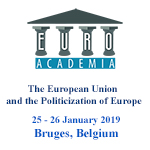Euroacademia Conferences
 Europe Inside-Out: Europe and Europeanness Exposed to Plural Observers (9th Edition) April 24 - 25, 2020
Europe Inside-Out: Europe and Europeanness Exposed to Plural Observers (9th Edition) April 24 - 25, 2020 Identities and Identifications: Politicized Uses of Collective Identities (9th Edition) June 12 - 13, 2020
Identities and Identifications: Politicized Uses of Collective Identities (9th Edition) June 12 - 13, 2020 8th Forum of Critical Studies: Asking Big Questions Again January 24 - 25, 2020
8th Forum of Critical Studies: Asking Big Questions Again January 24 - 25, 2020 Re-Inventing Eastern Europe (7th Edition) December 13 - 14, 2019
Re-Inventing Eastern Europe (7th Edition) December 13 - 14, 2019 The European Union and the Politicization of Europe (8th Edition) October 25 - 26, 2019
The European Union and the Politicization of Europe (8th Edition) October 25 - 26, 2019 Identities and Identifications: Politicized Uses of Collective Identities (8th Edition) June 28 - 29, 2019
Identities and Identifications: Politicized Uses of Collective Identities (8th Edition) June 28 - 29, 2019 The European Union and the Politicization of Europe (7th Edition) January 25 - 26, 2019
The European Union and the Politicization of Europe (7th Edition) January 25 - 26, 2019 7th Forum of Critical Studies: Asking Big Questions Again November 23 - 24, 2018
7th Forum of Critical Studies: Asking Big Questions Again November 23 - 24, 2018 Europe Inside-Out: Europe and Europeanness Exposed to Plural Observers (8th Edition) September 28 - 30, 2018
Europe Inside-Out: Europe and Europeanness Exposed to Plural Observers (8th Edition) September 28 - 30, 2018 Identities and Identifications: Politicized Uses of Collective Identities (7th Edition) June 14 - 15, 2018
Identities and Identifications: Politicized Uses of Collective Identities (7th Edition) June 14 - 15, 2018
A European Failure? The European Union’s Policy Towards Transnistria
-
-

-
Presentation speakers
- Keith Harrington, NUI Travelling Scholar in Humanities and Social Sciences, Maynooth University, Ireland
Abstract:
Since its creation in 1992, the Transnistrian region has enjoyed de-facto independence from Moldova. In 2003, Russian President, Vladimir Putin, unilaterally proposed the Kozak Memorandum to Moldovan President, Vladimir Vornion. The memorandum, although having some unsavoury articles for Moldova, represented the best option to date for the resolution of the Transnistrian dispute. However, the Kozak Memorandum was never signed, due to opposition from various EU leaders, which resulted in Putin’s visit to Moldova being cancelled on short notice. As a result, Russia took a hard line towards Moldova and decided that it would support the continued existence of the de-facto state. Despite interfering in the negotiation process, the European Union has failed to offer Moldova a viable alternative. The following paper will argue that the EU can and must become more active in the Transnistrian resolution for several reasons. Firstly, even though the Transnistrian authorities are overtly pro-Russian, the European Union imports more Transnistrian goods than the Russian Federation. As Transnistria’s largest trade partner, the European Union can use economic pressure to influence a settlement between the breakaway region and Moldova. The European Union’s hitherto reluctance to get involved in the negotiation process is also misguided. Since 2014, destabilisation in Ukraine has been a concern for the EU. The annexation of Crimea and the war in Eastern Ukraine brought instability to the continent, the likes not seen in Europe since the Yugoslav wars. The presence of an unrecognised state in Moldova not only potentially further destabilises the region, but it also brings the destabilisation much closer to Europe, given that Moldova borders Romania. Currently the EU holds the position of observer in the negotiations between Transnistria, Moldova, the OSCE and Russia. The paper will demonstrate that the EU can and must become more engaged in the resolution process.
-
Related Presentations

Left Problems, Nationalism and the Crisis
- Malcolm James
- Sivamohan Valluvan













